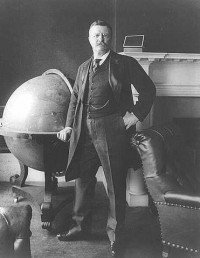Despite our philosophical, religious, political and cultural indoctrination to the contrary, the greatest thing a man can do for mankind is not to lay down his life for another. The greatest gift any man can give to another, or indeed to all of mankind, is to live his life to the fullest of its potential, grounding his every action in a profound sense of love for all, especially his own self, giving his deepest most divine creative gifts without reservation or shame, and modeling the quintessence of integrity in all matters.
The greatest lie ever told is that one’s own life is less important than the life of others, and therefore, one should be willing to make any sacrifice of rational self-interest demanded by others for the benefit of others, including perfect strangers. This idea lies at the very heart of the philosophy of altruism, which has perhaps done more damage to personal self esteem than any other philosophical construct ever conceived. Who has told and upheld the lie inherent in this idea? Well, for starters you and me, as well as virtually every person who has ever lived. At one time or another, we have either perpetrated or accepted this lie. It shows up in subtle and not so subtle ways. From simple every day “don’t be selfish” admonitions to asking someone to literally sacrifice their own life in a war they did not start.

Self sacrifice lies at the heart of slavery in all its forms whether physical, emotional, psychological, financial, political or otherwise..
This one lie provides the deleterious foundation for all manner of needless sacrifice made by billions of people over the course of human history. It is the basis of slavery in any form. It allows governments to sell the need for wars. It provides the impetus for taxation of personal wealth. It is the root cause of all feelings of unworthiness, shame and low self esteem, which themselves pave the way for all manner of addictions, disease and afflictions. These are just the short list of societal negatives attributable to this mother of all lies, and doesn’t even take into account the ways in which individuals are expected and even guilted into sacrificing their own best interests for others over and over every day of their lives.
There is literally no more acute and rational self-interest worth preserving than one’s own life. It is counter intuitive to our basic survival instinct to sacrifice our own authentic best interests for another, no matter how close or how distant they may be in relation, especially if guilt is being used as the motivator. I stress “authentic” to draw a distinction between self interest based on personal preference or sensual whim and self interest based on actual values grounded in truth principles.
For example, if an addictive behavior is creating disruption and chaos in familial or partnership relationships, the addict cannot justify such actions as being in anyone’s authentic best interests. There is no part of addiction in any form that can be justified as being founded on values based in truth principle. Nor, can it be said by the addict that the addictive behavior is authentically in his own best interests, especially since the purpose of virtually all addiction is to numb the addict from feeling the pain of their own unworthiness and shame. There is no honor in protecting one’s shame, nor can it be justified as being in one’s own best interest to do so.
Self Sacrifice Serving A Rationally Held Higher Value Is No Sacrifice

Ayn Rand’s classic “Atlas Shrugged” is the definitive statement on the ideal of rational self-interest.
The very idea of sacrifice itself implies that one give up something of personal high value for the sake of something else regarded as more important or worthy. Viewed purely from a rational perspective, this kind of exchange cannot even be said to be a sacrifice. Ayn Rand, founder of Objectivism and author of Atlas Shrugged, once wrote: “It is not self-sacrifice to die protecting that which you value: If the value is great enough, you do not care to exist without it. This applies to any alleged sacrifice for those one loves.” However, do not mistake this kind of high-minded ideal with the kind of self sacrifice generally practiced on a day in-day out basis by most of humanity.
When someone is asked to literally give up their life for another, the underlying premise upholding the request is that another person’s life, indeed any other person other than the one being asked to sacrifice, is of higher value. Be careful not to fall into this philosophical trap. It is a rare and exceptional circumstance when any one of us will ever actually be confronted with this kind of philosophical moral choice, unless we happen to be a soldier fighting in a war. Even law enforcement officers, firemen and other protectors are only rarely if ever actually confronted with this choice. For the record, if I were ever in a circumstance where it would become necessary to literally give up my life to protect my child or those I personally love, I would do it. However, once again, this kind of choice is rare.
In a more tangible and practical sense, people everywhere, every moment of every day are being asked by society, employers, governments and those closest to them to sacrifice their own best interests to the whims and perceived needs of others, any others other than their own self. This kind of request happens daily to everyone in a variety of ways from our most intimately interpersonal relationships all the way up to our relationship with society and to our governments. In many circumstances, we are often asked to sacrifice ourselves for the sake of co-dependence, incompetence or even outright corruption demonstrated by others, which unjustly penalizes the just and honorable person.
Today’s Self Sacrifice Is Not Teddy Roosevelt’s Brand
Much has been said over time in support of the apparent high-minded ideal of self-sacrifice, most often in support of the ideal of public service for the common good. Adding to the weight of such lofty statements is the identity and historical importance of many of the figures advocating self-sacrifice as a virtue. For example, former President Theodore Roosevelt, himself a staunch advocate in working tirelessly for the common good once wrote:

Theodore Roosevelt is perhaps the most persuasive example of self sacrifice as an ideal in the pursuit of public service.
“The men and women who have the right ideals . . . are those who have the courage to strive for the happiness, which comes only with labor and effort and self-sacrifice, and those whose joy in life springs in part from power of work and sense of duty.“
For the record, I am a Teddy Roosevelt fan of sorts and have a great deal of respect for his historic achievements, and generally believe him to be one of the truly great American Presidents, a man of integrity with the courage of his convictions. In the sense that Roosevelt means “self-sacrifice,” I do not necessarily disagree. However, Roosevelt was a man of lofty, rationally held, high minded values. He had a strong sense of self identity and no lack whatsoever of personal self esteem. His sense of “self sacrifice” was indeed no real sacrifice at all, because he held it as one of his highest values to give his life over to public service. In this, he was exceptional.
Unfortunately, the vast majority of people are not even remotely close to demonstrating Roosevelt’s high-minded ideals in their personal lives. The more common expression of “self sacrifice” is more often than not built on low self esteem, and is all but absent a guiding vision and personal purpose. We all could be Roosevelts, and for that matter, we could all be Jesus, perhaps the ultimate historical example of self sacrifice; however, the reality is we have some not insubstantial personal and collective work to do before we achieve such demonstration in our personal lives.
